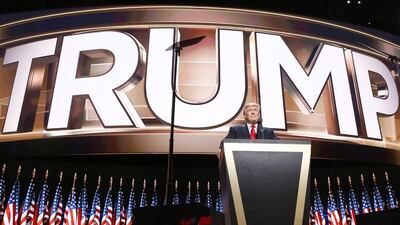In less than two weeks, the United States presidential election will have been decided. It will be the end of a tumultuous and turbulent campaign, perhaps the most boisterous in American political history. The signs are that Hillary Clinton will be the Democratic successor to Barack Obama in the White House. But it is equally clear that Donald Trump, the Republican nominee, will not be the loser. On the contrary – Mr Trump has already won, hugely.
For a while, it looked very much as though Mr Trump had a chance at actually winning the electoral race. He pounded through the Republican primaries, and was easily the winner of those contests. Some of his opponents were, in political and policy terms, probably even more destructive, but Mr Trump was by far the most flamboyant and erratic contender. That seems to have worked to his favour, at least in the Republican competition. But his repeated missteps in the presidential election campaign have cost him to the point where even diehard Republican political figures believe he is unelectable.
Anything is possible, but unless something truly catastrophic takes place, it is difficult to see how Mr Trump could claw back a lead over Mrs Clinton. His presidential ambitions are done – and judging how he is engaging in the media even more fitfully than before, it seems that he knows it.
But while his aspirations to move into the White House may be over, Mr Trump hasn’t lost. By any objective analysis, he has won and he has won big. Mr Trump’s engagement with mainstream political debates in the US has created a huge shock wave in American political discourse, and it has reverberated in the wider West. Even as Mr Trump’s presidential campaign winds to a close – with a whimper rather than a bang – his effect on politics is going nowhere.
Mr Trump has now redefined what “outlandish” and “out of bounds” actually mean in American politics in 2016. He has destroyed political conventions that have been in place for years. That is not simply going to disappear after the election.
Mr Trump’s style of politics is now at risk of being seen as part of the “ordinary”; what he has said about Muslims, minorities, women and other issues and topics is no longer seen as being that outrageous. It can’t be. He is the nominee for the presidency of one of the two major political parties in the US. Simply by virtue of that, he cannot be dismissed as fringe or marginal. He has indelibly changed what “normal” may actually mean. And in the context of the US, it is deeply concerning.
Generalisations, bigotry and “post-factual politics”, where contemptible political statements, rooted in precious little evidence, are not about to disappear. We need only to wait for the next leading figure in the Republican party to emerge and see what kind of politics he or she will deploy to win over the former Trump fans. It won’t be pretty.
But it is not only in the United States that Mr Trump has had an effect. Arguably, wider across the West, he probably deserves blame for encouraging the further degradation of our political discourse. Obviously, much of that existed before, but the “Trump effect” is hardly negligible. He has received huge amounts of media attention and that has had consequences.
Witness, just as one example, events in the United Kingdom in recent weeks. Following the terrorist tragedy in Nice, a Channel 4 newsreader, Fatima Manji, was the subject of a deeply bigoted and prejudiced article in a tabloid newspaper that saw fit to question her competence and ability to do her job as she reported on the attack. The complaint was as simple as it was repugnant: Manji is visibly Muslim, wearing the hijab, and as such should not report on violence perpetrated by extremist Muslims. One can only imagine what this kind of muscular illiberalism might have declared about a Jewish newsreader wearing a yarmulke if he covered a story concerning Rabbi Meir Kahane, the Jewish extremist figure. It is unlikely anyone would have said anything at all – and if anyone had, there would have been consequences.
When it comes to Manji, however, the press standards commission did not stand by the competence of an accomplished reporter. On the contrary, it allowed for bigotry to reign, and refused to censure the newspaper for its despicable piece – a piece where a white man targeted a woman of a minority ethnic group because of her religion. We have a problem – and it isn’t going anywhere anytime soon.
Mr Trump is likely to lose the election – and that’s good news, if only to limit the increased damage he could have done as president of the United States. But Mr Trump hasn’t lost. He has won, and Americans and non-Americans alike need to take seriously what needs to be done to push back against the victory that he has already achieved.
Dr HA Hellyer is a senior non-resident fellow at the Atlantic Council in Washington and the Royal United Services Institute in London
On Twitter: @hahellyer


